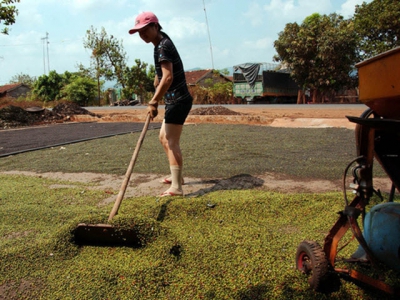Vietnam farmers warned not to expand black pepper crop to avoid glut

Vietnamese farmers should avoid expanding their black pepper crop to avoid the risk of oversupply, as prices in the world's largest producer of the household spice trade at a three-year high, an industry association said.
A file photo shows a farmer drying black pepper in Chu Se District, Gia Lai Province, Vietnam. Photo: Nguyen Cong Thanh / Tuoi Tre
Pepper prices have been on a roller-coaster ride with a glut in supply causing local prices to plunge about 80% from around 200,000 dong ($8.71) per kg in 2015 to 35,000 dong last year.
"When global pepper prices peaked at a record in 2015, VPA warned of a foreseeable situation of oversupply and recommended to not expand pepper acreage," the Vietnam Pepper Association said in an emailed statement.
"Nevertheless, the pepper industry worldwide declined over the last half a decade and hit a crisis in prices in 2020 due to oversupply."
Domestic prices have now recovered to a three-year high at around 70,000 dong per kg, though this is encouraging more production.
According to state media, the total pepper growing area in the Central Highlands province of Dak Nong recently expanded to 33,000 hectares (81,545 acres), well above the officially recommended 27,000 hectares.
In 2018, the VPA said it would reduce the area dedicated to pepper farming by encouraging farmers to grow other crops and by closing farms producing low-quality peppercorns.
The association now recommends that Vietnam's total pepper growing area should be capped at 120,000 hectares, compared with around 140,000 hectares currently.
Still, some farmers do not appear to be following the advice.
Nguyen Van Mai, a farmer in Dak Nong was planning to invest 70 million dong to expand his one-hectare pepper farm this year, he told the Lao Dong newspaper.
"We are very happy with the price increase, and that's why I have decided to invest in intercropping pepper into my existing coffee farm," Mai said.
Related news
 Vietnamese rice exports enjoy second quarter boost
Vietnamese rice exports enjoy second quarter boost By recording high export prices coupled with a consistent increase in orders, Vietnamese rice exports are projected to continue witnessing
 Vietnamese lychees head for EU markets
Vietnamese lychees head for EU markets The first batch of Hai Duong province’s Thanh Ha “thieu” lychees left Noi Bai International Airport in Hanoi on June 7 for the European Union (EU).
 Live streaming in Vietnam growing more popular for agricultural business
Live streaming in Vietnam growing more popular for agricultural business Farmers across the country have picked up live-streaming to boost sales amidst the COVID-19 pandemic.